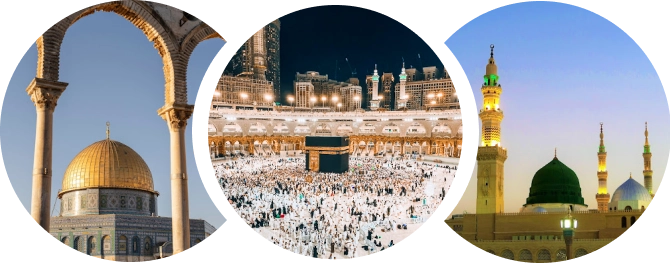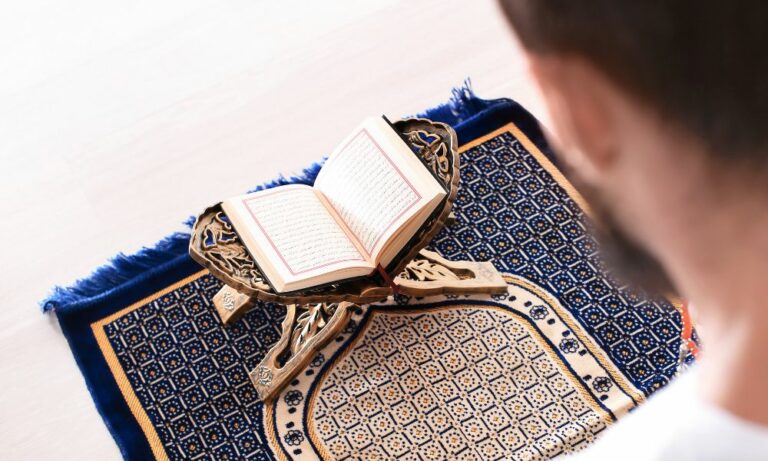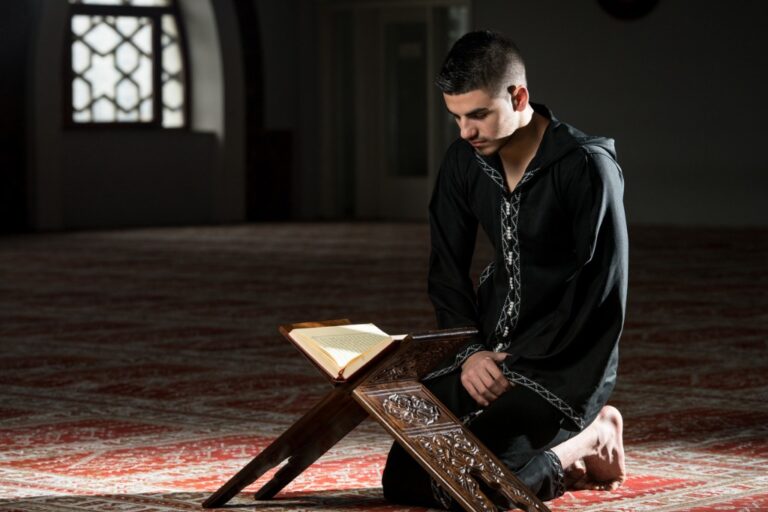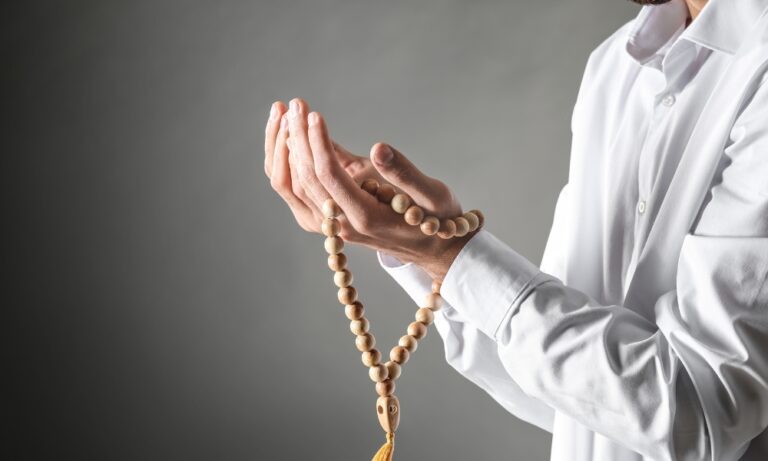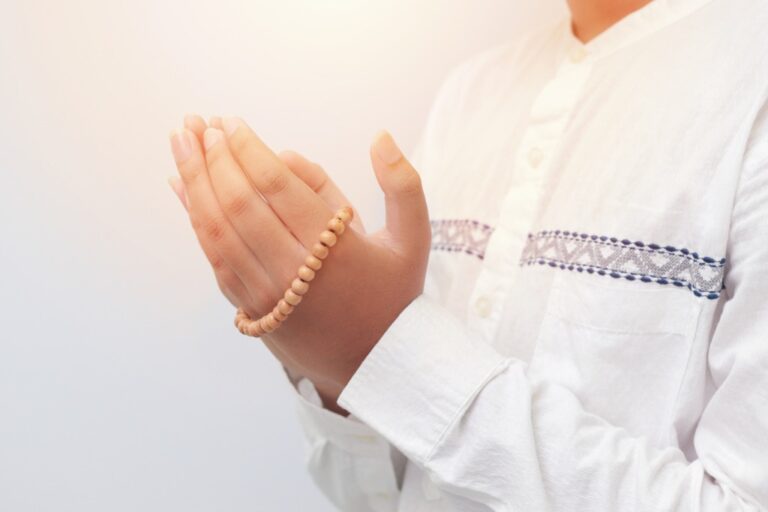How To Do Ghusl For Women
Are you wondering how to perform Ghusl as a Muslim woman correctly? Ghusl is an essential full-body purification ritual in Islam, paramount before prayers or after certain situations such as menstruation or sexual intimacy.
This blog will guide you through the process of performing Ghusl, outlining its significance and presenting a step-by-step approach tailored for women. Keep reading to gain practical knowledge on this vital Islamic practice.
Understanding the Concept of Ghusl in Islam


Ghusl is a significant purification ritual in Islam. This obligatory purification practice entails washing one’s entire body with the intention (Niyyah) of purifying oneself of physical and spiritual impurity.
It represents cleanliness and devotion to Allah SWT, physically and mentally preparing worshippers for sacred activities such as prayers, fasting or pilgrimage.
The uniqueness of Ghusl is found in its steps, which include thoroughly washing the body and beginning with an ablution (Wudu).
The ritual concludes by gently rinsing all other areas of your body with water at least once.
When is Ghusl Required For Women?


After Menstruation
The end of the menstrual cycle necessitates Ghusl. This period not only marks a crucial physiological shift for women but also represents a change in spiritual status.
To achieve ritual purity, Ghusl must be performed before resuming prayers or touching the Holy Quran.
Post-partum
In Islam, the post-partum period is a period following childbirth during which a woman may experience bleeding. This stage is crucial because it requires a ritual purification bath or Ghusl for women once the bleeding stops.
Through Ghusl, Muslim women can transition from post-partum impurity to purity and participate in obligatory prayers and other religious activities such as Jummah congregational prayers, and Eid prayers.
Following this stage, performing Ghusl represents one’s commitment to maintaining an absolute state of cleanliness in accordance with Islamic principles.
After Intercourse
Ghusl is also required after sexual intercourse to cleanse oneself.
It is necessary to use pure water sources such as well water, rainwater, or river water when performing Ghusl, and to avoid using impure or dirty water.
After Wet Dreams
أُمِّ الْمُؤْمِنِينَ، أَنَّهَا قَالَتْ جَاءَتْ أُمُّ سُلَيْمٍ امْرَأَةُ أَبِي طَلْحَةَ إِلَى رَسُولِ اللَّهِ صلى الله عليه وسلم فَقَالَتْ يَا رَسُولَ اللَّهِ، إِنَّ اللَّهَ لاَ يَسْتَحْيِي مِنَ الْحَقِّ، هَلْ عَلَى الْمَرْأَةِ مِنْ غُسْلٍ إِذَا هِيَ احْتَلَمَتْ فَقَالَ رَسُولُ اللَّهِ صلى الله عليه وسلم “ نَعَمْ إِذَا رَأَتِ الْمَاءَ ”.
(the mother of the believers) Um Sulaim, the wife of Abu Talha, came to Allah’s Messenger (ﷺ) and said, “O Allah’s Messenger (ﷺ)! Verily Allah is not shy of (telling you) the truth. Is it necessary for a woman to take a bath after she has a wet dream (nocturnal sexual discharge)?” Allah’s Messenger (ﷺ) replied, “Yes, if she notices a discharge.” Sahih al-Bukhari 282
It is obligatory to perform Ghusl after having a wet dream.
After Death
Ghusl is an essential ritual in Islam, even after death. Ghusl must be performed as a purification process before burial when a person dies. This is accomplished by washing the deceased’s body thoroughly in accordance with specific guidelines and procedures.
Ghusl after death is obligatory according to Islamic customs, and it should be performed by knowledgeable individuals or professionals familiar with the proper method.
Muslims who fulfill this religious obligation ensure that their loved one’s final resting places are prepared in accordance with Islamic traditions.
Types of Ghusl


There are two types of Ghusl: Fard (obligatory), and Sunnah (recommended).
Fard (Obligatory) Ghusl
Ghusl is obligatory on all women in certain situations, and they must perform it before engaging in any act of worship, such as sexual intercourse, after menstruation, post-partum, after death, and after wet dream. All of these have been discussed previously in depth.
Sunnah (Recommended) Ghusl
After Giving Ghusl to the Deceased
“ مَنْ غَسَّلَ مَيِّتًا فَلْيَغْتَسِلْ ” .
“Whoever washes a dead person, let him take a bath.” Sunan Ibn Majah 1463
In Islam, before burying a dead body, we have to give it a Ghusl, and Prophet Muhammad PBUH has commanded us to perform Ghusl after washing the deceased.
When a Non-Muslim Accepts Islam
A Sahabi Qays ibn Asim narrates that when he came to accept Islam in front of Prophet Muhammad PBUH, he commanded him to bathe with water boiled with the leaves of a lote tree. Sunan Abi Dawud 355
On Fridays
On Fridays, Muslims also perform Ghusl before attending the weekly congregational prayer at the mosque. Furthermore, Ghusl is also recommended on Eid days and other special holidays.
“ مَنْ تَوَضَّأَ يَوْمَ الْجُمُعَةِ فَبِهَا وَنِعْمَتْ وَمَنِ اغْتَسَلَ فَالْغُسْلُ أَفْضَلُ ”
“Whoever performs Wudu on Friday, then he will receive the blessing, and whoever performs Ghusl then Ghusl is more virtuous.” Jami` at-Tirmidhi 497
Preparations for Ghusl
To prepare for Ghusl, there are a few essential steps you should follow:
- Locate a clean and private location where you can perform Ghusl without disturbance.
- Make sure you have enough water for the entire process.
- Before you begin, make sure your body and the surrounding area are clean and free of impurities.
- Gather all necessary items in one place, such as soap, shampoo, a towel, and clean clothes.
- Begin by setting a firm intention (niyyah) in your heart to perform Ghusl for the purpose specified.
- Recite the Dua “Bismillah” before beginning to wash yourself.
Step-by-step Guide on How to Perform Ghusl


There are some obligatory steps of Ghusl that you must perform, and if you miss any of them, then your Ghusl will be incomplete:
- The first step is to set your intention to cleanse yourself of any impurities you may be carrying.
- Then, wash your entire body, making sure that no part of your body is left untouched.
- Now, rinse the mouth and nose properly.
These are considered the obligatory steps of Ghusl, but if you want to make your Ghusl much better and rewarding, then follow the below steps:
- Set the intention to perform Ghusl.
- Say Bismillah (in the name of Allah), wash your hands thrice and then wash your private parts.
- Perform wudu in the same way that you would pray.
- Pour water over your head, ensuring it gets all the way to your hair.
- Wash your entire body, making sure no part is left dry.
This form of Ghusl is the Sunnah of the Prophet Muhammad PBUH. Sahih al-Bukhari 248, Sahih al-Bukhari 265
Should Women Wash Their Entire Hair During Ghusl?


The method of performing Ghusl for men and women is the same, except that women do not need to wash their entire hair; instead, their Ghusl would be valid by washing their scalp.
Umme Salamah asked the prophet in a hadith, “I am a woman with tightly braided hair; should I undo it when performing Ghusl from Janabah?” He replied, ‘No, it is sufficient for you to pour three handfuls of water over your body.'” Sunan an-Nasa’i 241
The hadith demonstrates that it is not necessary for women to undo their hair or wash their entire hair to perform Ghusl; instead, it is sufficient if they wash the roots of their hair.
Acts Prohibited Without Ghusl
Performing any of the following acts without performing Ghusl is prohibited:
- Offering prayers: It is not permissible to offer prayers without first performing Ghusl after engaging in any activities that require Ghusl.
- Reciting or touching the Quran: Touching or reciting the Quran without purifying oneself through Ghusl is prohibited.
- Entering a mosque: It is forbidden to enter without being in a state of ritual purity achieved through Ghusl.
- Observing fasts: Fasting is invalid if one has not performed Ghusl after engaging in activities requiring purification.
- Performing Umrah pilgrimage: Before embarking on the Umrah pilgrimage, one must perform Ghusl to ensure cleanliness and purity.
- Participating in Hajj rituals: Ghusl must be performed before participating in specific ways, such as Tawaf (circumambulation) around the Kaaba or standing at Arafat during the Hajj pilgrimage.
- Wearing ihram for Hajj or Umrah: Wearing the ihram clothing for Hajj or Umrah necessitates achieving ritual purity through Ghusl.
Note: All of these acts require Ghusl only when you are in a state of impurity, i.e., you have been through a form that has made Ghusl obligatory on you, and we have mentioned all these states above.
Conclusion
In conclusion, performing Ghusl is an essential ritual for women in Islam. It is necessary after menstruation, post-partum, and sexual intercourse. By following the step-by-step guide and understanding the obligatory acts of Ghusl, women can ensure their purification before engaging in prayers and other religious activities.
FAQs
What is Ghusl for women?
Ghusl is a ritualistic cleansing process that Muslim women use to cleanse themselves after menstruation, postnatal bleeding, or sexual intercourse.
Are there specific steps or guidelines to follow when performing Ghusl?
Yes, there are steps to take when performing Ghusl. These include washing your hands and private parts before beginning, rinsing out your mouth and nose several times, washing the right side first, then the left, and ensuring that water reaches all body parts.
Can I perform Ghusl at any time, or are there specific timings?
Ghusl should be performed as soon as possible after experiencing the condition that requires it (for example, after menstruation or sexual intercourse). However, it can be done at any time convenient for you as long as all necessary steps for complete purification are followed.
كيفية غسل النساء
هل تتساءلين عن كيفية غسل المرأة المسلمة بشكل صحيح؟ الغسل هو طقوس أساسية لتطهير الجسم بالكامل في الإسلام، وله أهمية قصوى قبل الصلاة أو بعد حالات معينة مثل الحيض أو العلاقة الجنسية.
سترشدك هذه المدونة خلال عملية الغسل، وتوضح أهميتها وتقدم منهجًا خطوة بخطوة مصممًا خصيصًا للنساء. استمر في القراءة لاكتساب المعرفة العملية حول هذه الممارسة الإسلامية الحيوية.
فهم مفهوم الغسل في الإسلام


الغسل هو طقوس تطهير مهمة في الإسلام. تشتمل ممارسة التطهير الإلزامية هذه على غسل الجسم كله بنية التطهير من النجاسة الجسدية والروحية.
إنه يمثل النظافة والإخلاص لله سبحانه وتعالى، وإعداد المصلين جسديًا وعقليًا للأنشطة المقدسة مثل الصلاة أو الصيام أو الحج.
إن خصوصية الغسل تكمن في خطواته التي تتضمن غسل الجسم جيدًا والبدء بالوضوء.
وتنتهي الطقوس بشطف جميع مناطق الجسم الأخرى بالماء بلطف مرة واحدة على الأقل.
متى يجب الغسل على المرأة؟


بعد الدورة الشهرية
انتهاء الدورة الشهرية يوجب الغسل. لا تمثل هذه الفترة تحولًا فسيولوجيًا حاسمًا بالنسبة للنساء فحسب، بل تمثل أيضًا تغييرًا في الحالة الروحية.
ولتحقيق الطهارة يجب الغسل قبل استئناف الصلاة أو مس المصحف الشريف.
ما بعد الولادة
في الإسلام، فترة ما بعد الولادة هي الفترة التي تلي الولادة والتي قد تتعرض خلالها المرأة للنزيف. وهذه المرحلة حاسمة لأنها تتطلب حمام طهارة أو غسل للنساء بعد توقف النزيف.
من خلال الغسل، يمكن للمرأة المسلمة الانتقال من نجاسة ما بعد الولادة إلى الطهارة والمشاركة في صلاة الفريضة والأنشطة الدينية الأخرى مثل صلاة الجمعة وصلاة العيد.
بعد هذه المرحلة، يمثل الغسل التزام الشخص بالحفاظ على حالة النظافة المطلقة وفقًا للمبادئ الإسلامية.
بعد الجماع
الغسل مطلوب أيضًا بعد الجماع لتطهير النفس.
يجب عند الغسل استعمال مصادر المياه النقية كمياه الآبار أو مياه الأمطار أو مياه الأنهار، وتجنب استخدام المياه النجسة أو القذرة.
بعد الاحتلام
أُمِّ الْمُؤْمِنِينَ، أَنَّهَا قَالَتْ جَاءَتْ أُمُّ سُلَيْمٍ امْرَأَةُ أَبِي طَلْحَةَ إِلَى رَسُولِ اللَّهِ صلى الله عليه وسلم فَقَالَتْ يا رَسُولَ اللَّهِ، إِنَّ اللَّهَ لاَ يَسْتَحْيِي مِن َ الْحَقِّ، هَلْ عَلَى الْمَرْأَةِ مِنْ غُسْلٍ إِذَا هِيَ احْتَلَمَتْ فَقَال رَسُولُ اللَّهِ صلى الله عليه وسلم " نَعَمْ إِذَا رَأَتِ الْمَاءَ ".
(أم المؤمنين) جاءت أم سليم امرأة أبي طلحة إلى رسول الله صلى الله عليه وسلم فقالت: يا رسول الله إن الله لا تستحيي من الحق هل يجب على المرأة أن تغتسل بعد الاحتلام؟ فقال رسول الله صلى الله عليه وسلم: «نعم إذا رأت الماء». صحيح البخاري 282
ويجب الغسل بعد الاحتلام.
بعد الموت
الغسل من الطقوس الأساسية في الإسلام، حتى بعد الموت. يجب أن يتم الغسل كعملية تطهير قبل الدفن عند وفاة الشخص. ويتم ذلك عن طريق غسل جسد المتوفى جيدًا وفقًا لإرشادات وإجراءات محددة.
الغسل بعد الموت واجب شرعًا، ويجب أن يقوم به أهل العلم أو المحترفون الذين يعرفون الطريقة الصحيحة.
المسلمون الذين يؤدون هذا الواجب الديني يتأكدون من أن المثوى الأخير لأحبائهم مُجهز وفقًا للتقاليد الإسلامية.
أنواع الغسل


هناك نوعان من الغسل: الفرض (الواجب)، والسنة (المستحب).
فرض الغسل
الغسل واجب على جميع النساء في أحوال معينة، ويجب عليهن القيام به قبل ممارسة أي عبادة، كالجماع، بعد الحيض، والنفاس، وبعد الموت ، وبعد الاحتلام. وقد تمت مناقشة كل هذه الأمور بعمق من قبل.
السنة (المستحب) الغسل
بعد تغسيل الميت
" مَنْ غَسَّلَ مَيِّتًا فَلْيَغْتَسِلْ ".
"من غسل ميتا فليغتسل." سنن ابن ماجه 1463
في الإسلام، يجب غسل الميت قبل دفنه، وقد أمرنا النبي محمد صلى الله عليه وسلم أن نغتسل بعد غسل الميت.
عندما يقبل غير المسلم الإسلام
عن الصحابي قيس بن عاصم أنه لما أسلم بين يدي النبي محمد صلى الله عليه وسلم أمره أن يغتسل بماء مغلي بورق السدرة. سنن أبي داود 355
أيام الجمعة
في أيام الجمعة، يغتسل المسلمون أيضًا قبل حضور صلاة الجماعة الأسبوعية في المسجد. علاوة على ذلك، يُنصح بالغسل أيضًا في أيام العيد والأعياد الخاصة الأخرى.
" مَنْ تَوَضَّأَ يَوْمَ الْجُمُعَةِ فَبِهَا وَنِعْمَتْ وَمَنِ اغْتَسَلَ فَالْغُسْلُ أَفْضَلُ "
"من توضأ يوم الجمعة فله البركة، ومن اغتسل ثم اغتسل فهو أفضل." جامع الترمذي 497
الاستعدادات للغسل
للتحضير للغسل هناك بعض الخطوات الأساسية التي يجب عليك اتباعها:
- حدد مكانًا نظيفًا وخاصًا حيث يمكنك الاغتسال دون إزعاج.
- تأكد من أن لديك كمية كافية من الماء طوال العملية.
- قبل البدء، تأكد من نظافة جسمك والمنطقة المحيطة به وخلوها من الشوائب.
- اجمع كل العناصر الضرورية في مكان واحد، مثل الصابون والشامبو والمنشفة والملابس النظيفة.
- ابدأ بوضع نية ثابتة في قلبك للغسل للغسالة المخصصة له.
- اقرأ دعاء "بسم الله" قبل البدء في الاغتسال.
دليل خطوة بخطوة لكيفية الغسل


هناك بعض خطوات الغسل الواجبة التي يجب عليك القيام بها، وإذا فاتك أي منها فإن غسلك يكون ناقصًا:
- الخطوة الأولى هي تحديد نيتك لتطهير نفسك من أي شوائب قد تحملها.
- ثم، اغسل جسمك بالكامل، وتأكد من عدم ترك أي جزء من جسمك دون مساس.
- الآن، اشطف الفم والأنف بشكل صحيح.
تعتبر هذه من خطوات الغسل الواجبة، ولكن إذا كنت تريد أن تجعل غسلك أفضل وأكثر مكافأة، فاتبع الخطوات التالية:
- حدد نية الغسل.
- قل بسم الله، واغسل يديك ثلاث مرات، ثم اغسل فرجك.
- توضأ بنفس الطريقة التي تصلي بها.
- صبي الماء على رأسك، وتأكدي من وصوله إلى شعرك.
- اغسل جسمك بالكامل، وتأكد من عدم ترك أي جزء جافًا.
وهذا النوع من الغسل هو سنة النبي محمد صلى الله عليه وسلم. صحيح البخاري 248, صحيح البخاري 265
هل يجب على المرأة غسل شعرها بالكامل أثناء الغسل؟


طريقة الغسل للرجال والنساء هي نفسها، إلا أن المرأة لا تحتاج إلى غسل كامل شعرها؛ بل يكون غسلهم صحيحاً بغسل فروة الرأس.
سألت أم سلمة النبي في الحديث: "أنا امرأة شديدة الضفر، أفأنقضه عند غسل الجنابة؟" قال: لا، يكفيك أن تحثي على جسدك ثلاث حثيات من الماء.» سنن النسائي 241
وفي الحديث أنه لا يجب على المرأة نقض شعرها أو غسل كامل شعرها للغسل؛ بل يكفي أن يغسلوا جذور شعرهم.
الأفعال المحرمة بدون الغسل
يحرم القيام بأي من الأفعال التالية دون الغسل:
- إقامة الصلاة: لا يجوز أداء الصلاة دون الاغتسال أولاً بعد القيام بأي أنشطة تتطلب الغسل.
- قراءة القرآن أو لمسه: يحرم لمس القرآن أو تلاوته دون طهارة بالغسل.
- دخول المسجد: يحرم الدخول دون أن يكون على طهارة تتحقق بالغسل.
- الصيام: لا يصح الصيام إذا لم يغتسل بعد القيام بالأنشطة التي تتطلب الطهارة.
- أداء العمرة: قبل الشروع في العمرة، يجب على المرء أن يغتسل للتأكد من النظافة والطهارة.
- المشاركة في مناسك الحج: يجب الغسل قبل المشاركة بطرق محددة، مثل الطواف حول الكعبة أو الوقوف بعرفات أثناء الحج.
- ارتداء الإحرام بالحج أو العمرة: ارتداء ملابس الإحرام بالحج أو العمرة يستلزم تحقيق الطهارة من خلال الغسل.
ملاحظة: كل هذه الأفعال لا تحتاج إلى الغسل إلا وأنت على نجاسة، أي أنك مررت بوضع يوجب عليك الغسل، وقد ذكرنا جميع هذه الحالات أعلاه.
الاستنتاج
في الختام، يعتبر الغسل من الطقوس الأساسية للمرأة في الإسلام. فمن الضروري بعد الحيض، وبعد الولادة، والجماع. ومن خلال اتباع الدليل التفصيلي وفهم واجبات الغسل، يمكن للمرأة التأكد من طهرها قبل أداء الصلاة والأنشطة الدينية الأخرى.
الأسئلة الشائعة
ما هو الغسل للنساء؟
الغسل هو عملية تطهير طقسية تستخدمها المرأة المسلمة لتطهير نفسها بعد الحيض أو نزيف ما بعد الولادة أو الجماع.
هل هناك خطوات أو إرشادات معينة يجب اتباعها عند الغسل؟
نعم هناك خطوات يجب اتباعها عند الغسل. وتشمل هذه غسل اليدين والأجزاء الحساسة قبل البدء، وشطف الفم والأنف عدة مرات، وغسل الجانب الأيمن أولاً، ثم الأيسر، والتأكد من وصول الماء إلى جميع أجزاء الجسم.
هل يمكنني الغسل في أي وقت أم أن هناك أوقات محددة؟
يجب الغسل في أسرع وقت ممكن بعد تجربة الحالة التي تتطلب ذلك (على سبيل المثال، بعد الحيض أو الجماع). ومع ذلك، يمكن القيام بذلك في أي وقت يناسبك بشرط اتباع جميع الخطوات اللازمة للتطهير الكامل.

